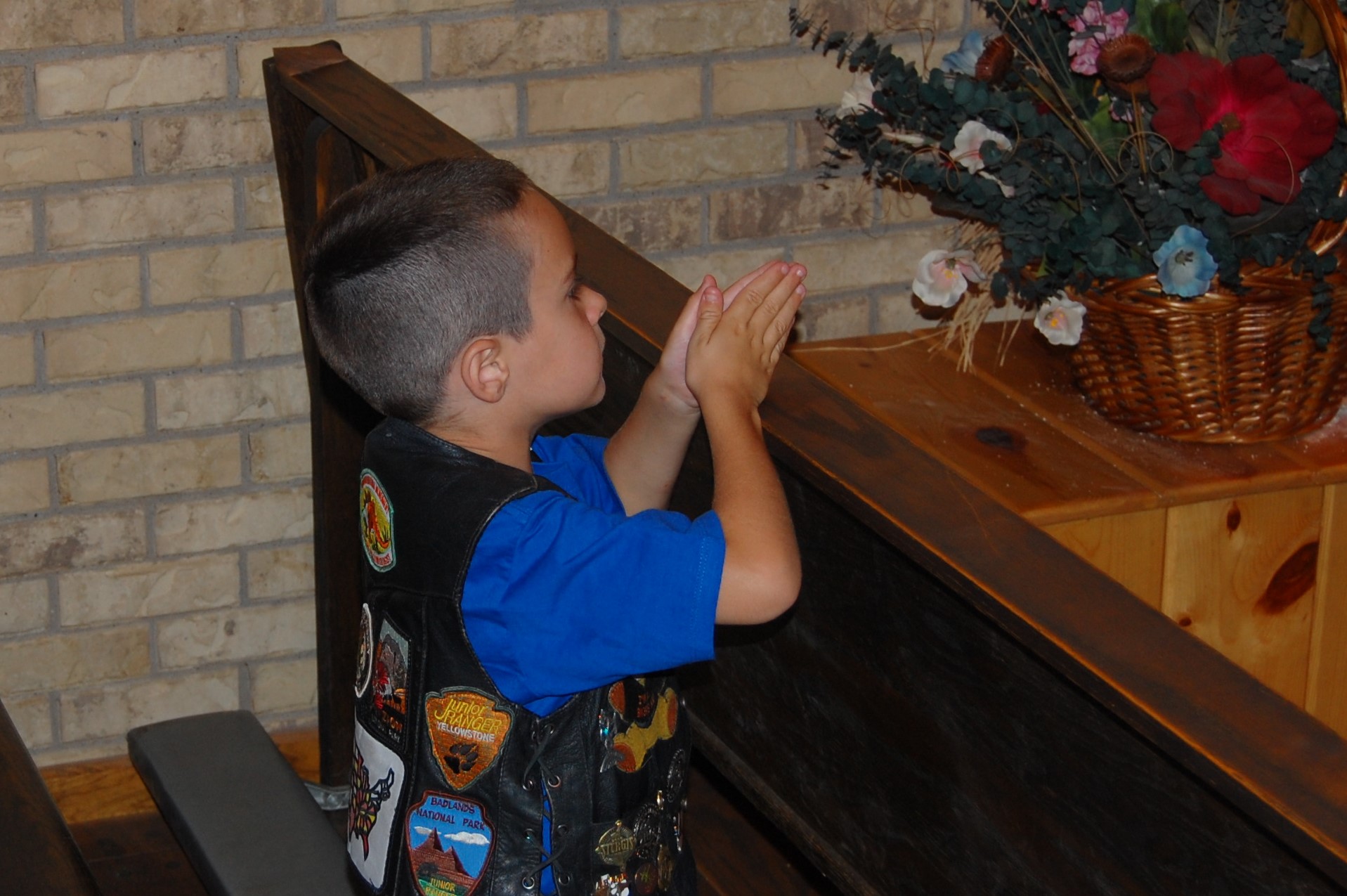Take It To Prayer
 "Take it to prayer." Has someone ever said that to you? I tend to say it a lot these days and only recently had the thought that maybe the other person doesn't actually know how to do that. It wasn't long ago when I would have struggled to understand what that meant as well. How many Hail Mary's did I need to pray? How many rosaries? Do I need to do a Novena? What does it mean to take something to prayer?
"Take it to prayer." Has someone ever said that to you? I tend to say it a lot these days and only recently had the thought that maybe the other person doesn't actually know how to do that. It wasn't long ago when I would have struggled to understand what that meant as well. How many Hail Mary's did I need to pray? How many rosaries? Do I need to do a Novena? What does it mean to take something to prayer?
I remember having an AHA moment about that when I was in formation to become a spiritual director. We were practicing giving spiritual direction, with one person acting as the director and the other as the one being directed. I shared a struggle I was having and the director asked, "What did you hear when you brought that to God?" I was surprised by the question. I hadn't actually taken it to God. I was trying to figure it out by myself. That was a significant moment for me – a realization of my own tendency to go it alone.
That moment led to a question in my mind. Exactly how would I bring that to God? It's not like I can have a normal conversation and get a verbal answer. That's not been my experience in prayer, although I know some people do hear God's voice in an audible way. But I don't. So I needed to figure out how to take something to God in prayer and better hear His voice in response. Maybe you have had the same question.
Let's begin to answer that by considering the kinds of things we might bring to God in prayer and then how we would do that.
We can take our problems and inconveniences to prayer. Everyone has frustrating moments when things don't go the way you planned. That's not uncommon for me. Recording a podcast, posting a blog, writing a book – all of these have technical components that sometimes don't work right. And because I am not a technical kind of person, I get frustrated. My natural inclination is to whine about the problem. Surprisingly enough, that rarely brings a solution. I have learned to take these frustrations to God. I actually stop what I'm doing and pray for help. I leave it alone for a while. I trust that God will work it out or give me a direction to go for help. And it always happens.
We also bring our crosses to God in prayer. Jesus tells us to pick up our cross and follow Him. It would be nice if we didn't have a cross to carry, but we do – at least while here on earth. So we take the cross, the challenges, the difficulties to God in prayer. We can express our frustrations and anger. If we feel it, God knows it, so there is no reason to hide these emotions. We can cry out in pain when it hurts and ask for relief and comfort. We can ask for strength and to feel His presence helping us carry our cross. We can pray for wisdom so that our time of suffering bears fruit. We can pray for greater humility and trust. We can pray for peace in the midst of the storm.
We take our loved ones to prayer. We all have someone that we worry about. They are on a bad path or in a difficult marriage or carrying a heavy cross of their own. These kinds of problems are not new. Since the fall of man people have chosen to take the wide road to destruction rather than the narrow one to Heaven. How do I pray about those things? I like to give God a plan for fixing things. I lay out all the steps – kind of like giving God His marching orders, as if He needed my help to figure it out. I seem to think that the One who created everything needs my advice. Clearly I think too much of myself. A better way to bring our loved ones to prayer is to present the problem or issue and ask for God's help. Acknowledge that God is the source of all good and can do the impossible. Recognize that He loves the person more than you do. And be persistent, praying constantly for the individual. I have a prayer for my son that I pray every morning. It addresses specific challenges he faces. I gave him a copy and told him to pray it daily (pretty sure he does not) and that I would do the same – and I do.
We take our decisions to prayer. When I was considering retirement, it was a tough decision. I loved my job but my husband was retired and wanted us to spend more time together. So I took the decision to prayer for one month. I knew what I wanted and I knew what my husband wanted. I did not know what God wanted. So each night I prayed about it and journaled on my thoughts about retirement. The month was passing quickly and still I had no clear decision. It was not until the last day of the month that I knew it was God's will that I retire. I actually wasn't happy about it. It was more like, "Fine! I'll retire!" And I did. When taking a decision to prayer, we ask God to reveal His will and to give us the grace to desire only that.
We bring our spiritual struggles to prayer. Are you in a dry season? Are you in a rut or are you neglecting prayer? Do you want a more fruitful prayer life? Do you wonder if you even know what it means to pray? After all, everyone else seems to have figured it out. When we struggle in our prayer life, the natural response is to stop praying. After all, it's not working so why waste time. That's actually the opposite of what we should do. We need to continue with the spiritual practices we have committed to. It may mean sitting in prayer without feeling anything or having any profound insights. We just sit before God empty. Barren. We tell God of our frustration and we accept the dryness out of love for Him.
We bring our weaknesses to God in prayer. My weaknesses frustrate me. I want to be better but I stumble. I want to have love in my heart, but some people make it hard to love. I want to be patient, but sometimes I'm tired and things get on my last nerve. When I bring my weaknesses to God, something beautiful happens. I feel better. Not in the way that the weaknesses don't matter, but that God loves me in spite of those weaknesses. And I have hope that I can overcome the weaknesses. I ask for help understanding why I have specific weaknesses. What are the underlying beliefs that are based in lies? What are my fears that keep me from doing God's will? Why can the enemy of my soul attack me in that specific area so easily? These are all questions I bring to prayer to better understand and overcome my weaknesses.
We bring our goals to prayer. I have lots of goals. There are always new ideas coming to mind, and I want to do them all. I want to be sure I am doing what He wants me to do and not being led astray by the allure of other "brighter" tasks. I can also get overloaded and so busy that my prayer life suffers, but if I bring my goals to prayer, I check with God before taking on a task. Then my life is more manageable and I am living in God's will and not my own.
We bring our work to prayer. Sometimes I struggle when I am writing. I might get started and then look at it and think it's terrible. When I pray first, the words come. No matter what work you do, you can bring it to God in prayer. I am just finishing my second book and am planning how to promote it. That's not something I want to bother with, but it is necessary. I heard a talk about how to create a good marketing plan for a book and came out with tons of ideas. As I began planning to implement those ideas, I had a clear vision of yellow flags waving, like the caution flags at a car race. I knew God was warning me that my plan was too much. I took that work to prayer. What part of the plan should I keep and what do I let go? And He answered. Offer your work to God so that you can do that work well. When you get stuck, take a prayer break. When you finish, pray in thanksgiving. If someone notices your work, thank God for that affirmation.
We bring our joys and successes to prayer. As we pray in thanksgiving we are lifted up to God and can be amazed at His generosity. All good things come from Him – the source of all good. We grow in confidence in our faith, trusting God in all things because we recognize that He has been there for us through all things. My life is a little chaotic right now, with many demands from different directions, and I often find myself at the end of a long day marveling at what I got accomplished. I pray in thanksgiving for how it all worked out. As I do, my trust in God's providence continues to grow.
That's what it means when someone says, "Take it to prayer." We have a conversation with God about our crosses, our loved ones, our decisions, our spiritual struggles, our weaknesses, our goals, our work, our joys and successes. We share our hearts with God and we listen for His voice, His direction, His comfort.
There is one more element of taking it to prayer, which is recognizing God's voice. We want to know God's voice and distinguish it from the voice of the enemy or our own voice. The only way to know God's voice is to read His Word – the Bible. Start with the Gospels and meditate on the teachings of Jesus. That is how you will come to know the voice of the Good Shepherd.
Questions to ponder:
-
What things have I neglected to bring to prayer? Why?
-
What can I do to more fruitfully bring things to prayer?

